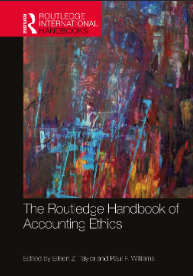موضوعات
آموزش و پرورش
ادبیات و زبان
پزشکی، دندانپزشکی و داروسازی
تاریخ و جغرافیا
داستان و رمان
دیگر
دین و فلسفه
روانشناسی
ریاضیات و آمار
سلامتی، تناسب اندام و رژیم غذایی
شیمی و پلیمر
علوم اجتماعی و حقوق
علوم زیستی و بیوتکنولوژی
فیزیک و نجوم
کامپیوتر و اینترنت
کتابهای کودکان و داستان
کسب و کار و اقتصاد
کشاورزی و دامپزشکی و غذا
معماری
مهندسی و فناوری
هنر و تئاتر
محصولات
HE ROUTLEDGE HANDBOOK OF ACCOUNTING ETHICS - Original PDF
نویسندگان: خلاصه: 1 INTRODUCTION Eileen Z. Taylor and Paul F. Williams “Ethics” and “morals” are two terms about which there is ambiguity. Some scholars consider the terms to be synonymous. Others make a distinction that ethics pertains to right conduct vis-à-vis others, while morals pertains to one’s personal sense of right conduct; still others reverse that distinction. Philosophers tend to regard the distinction between “ethics” and “morals” to be that ethics pertains to a centuries-old conversation about how we decide what is good and bad, right and wrong, while morals is the content of good and bad, right and wrong. The perspective on “ethics” taken in this book is this latter sense; thus the title Companion to Accounting Ethics. The book’s purpose is not to be a handbook of accounting rights and wrongs but rather a collec- tion of conversations employed by educators to assist students of accounting to become more attuned to accounting’s ethical aspects and to become more critical thinkers about the ethical complexities of the function of accounting in human society. As a social science, accounting is the creation of people, for the purpose of accounting for transactions (generally monetary) between and among groups of people. Accounting does not exist without people, and its rules of the day are determined by people; it is mutable and wholly dependent on both the decisions made by people with economic power and acceptance of those decisions by those same people. Similarly, ethics are enacted by people, and the ethicality of an action is determined by the individual affected by the action, as well as by the collective societal acceptance or rejection of an action. Accounting, because it is people driven, inherently has an ethical component. Every deci- sion about how to account for a transaction at some point affects an individual, either directly or indirectly. For example, decisions about recording revenue affect those whose income is commission-based. Decisions about recording an expense affects taxes paid (and received by the government for the benefit of society). Our primary goal with this book is to call attention to the intersectionality of accounting and ethics and to encourage students and researchers to consider the ethical implications of accounting decisionsآیا کتاب مورد نظر هنوز بر روی سایت قرار نگرفته است؟ جای نگرانی نیست! کافی است بر روی گزینه سفارش کتاب کلیک کرده و درخواست خود را ثبت کنید. در کمتر از چند ساعت کتاب شما را آماده خواهیم کرد.
